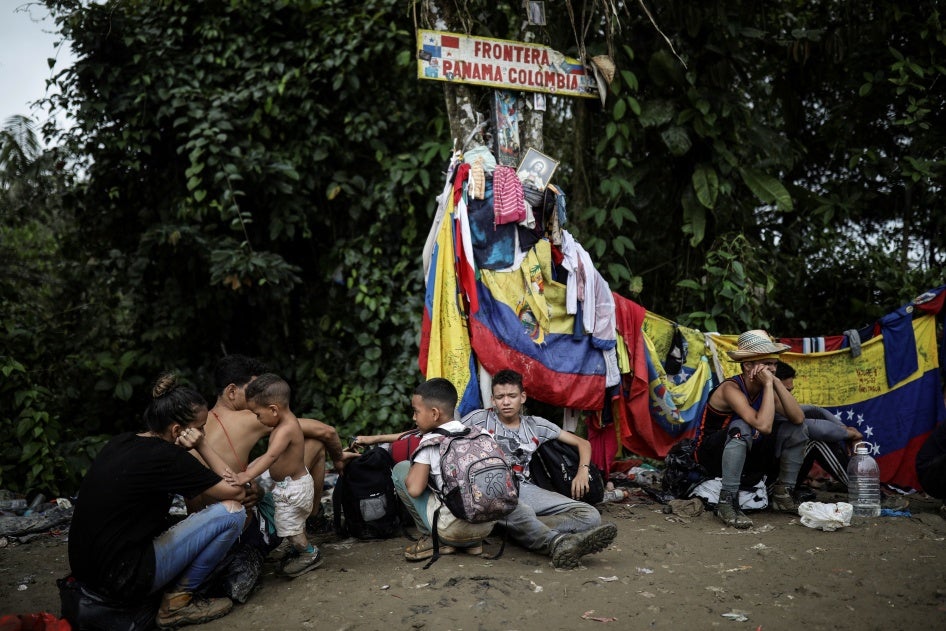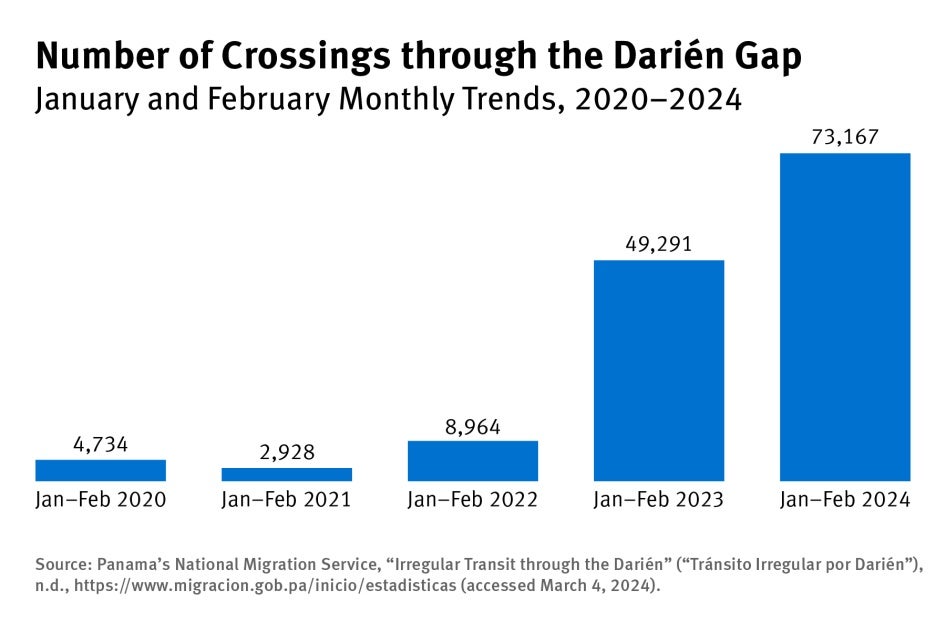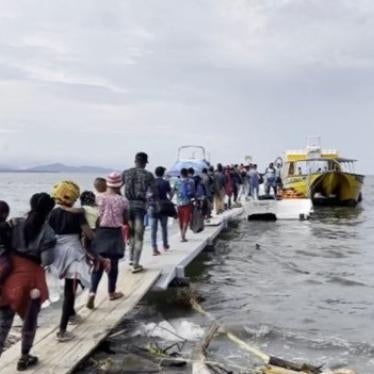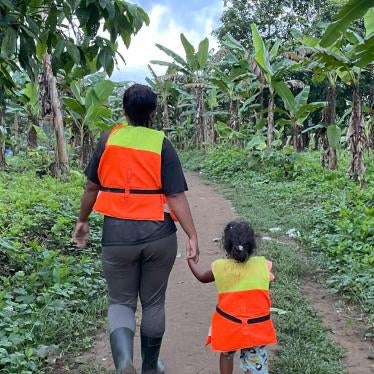- Colombia and Panama are failing to effectively protect and assist hundreds of thousands of migrants and asylum seekers in the Darién Gap and to investigate abuses there.
- Over half a million people, including 113,000 children, crossed the Darién Gap in 2023. Panamanian authorities estimate that the number of people crossing is likely to be even higher in 2024.
- Colombian and Panamanian authorities should prevent exploitation by criminal groups and bandits, conduct criminal investigations, and ensure access to food, water, and basic healthcare services.
(Bogota) – Colombia and Panama are failing to effectively protect and assist hundreds of thousands of migrants and asylum seekers transiting through the Darién Gap, Human Rights Watch said in a report released today.
The 110-page report, “Neglected in the Jungle: Inadequate Protection and Assistance for Migrants and Asylum Seekers Crossing the Darién Gap,” is the second in a series of Human Rights Watch reports on migration via the Darién Gap. Human Rights Watch identified specific shortcomings in Colombia’s and Panama’s efforts to protect and assist people – including those at higher risk, such as unaccompanied children – as well as to investigate abuses against them.
“Whatever the reason for their journey, migrants and asylum seekers crossing the Darién Gap are entitled to basic safety and respect for their human rights along the way,” said Juanita Goebertus, Americas director at Human Rights Watch. “Colombian and Panamanian authorities can and should do more to ensure the rights of migrants and asylum seekers crossing their countries, as well as of local communities that have experienced years of neglect.”
Human Rights Watch visited the Darién Gap four times between April 2022 and June 2023 and interviewed almost 300 people, including migrants and asylum seekers, victims of serious abuses, aid workers, and Colombian and Panamanian authorities. Between January 2022 and March 2024, researchers also conducted phone and virtual interviews. Human Rights Watch also reviewed data and reports by the Colombian, Panamanian, and United States governments; United Nations agencies; international, regional, and local human rights and humanitarian organizations; and local legal clinics, and repeatedly sent information requests to Colombian and Panamanian authorities, who in most cases responded.
Human Rights Watch found that on both sides of the border, the authorities are failing to effectively protect the right to life and physical integrity of transiting migrants and asylum seekers, and to investigate violations effectively, promptly, and thoroughly. Efforts to guarantee access to food, water, and essential healthcare services have proven inadequate, affecting the basic rights of both migrants and local communities that have experienced longstanding marginalization, high poverty rates, and a lack of opportunities.
Crimes against migrants and asylum seekers in the Darién Gap, including pervasive cases of sexual violence, go largely uninvestigated and unpunished on both sides of the border. Accountability for these abuses is rare due to a combination of limited resources and personnel, a lack of a criminal investigation strategy for these cases, and poor coordination between Colombian and Panamanian authorities.
On March 4, 2024, the Panamanian government suspended the work of Médecins Sans Frontières (Doctors without Borders or MSF) in the country, saying that its agreement with the humanitarian group had ended in December. MSF says that they have been seeking a renewal since October. The organization played a leading role in assisting migrants and asylum seekers, including hundreds of survivors of sexual violence.
“Restricting MSF’s work is exactly the opposite of what is needed to address the situation in the Darién Gap,” Goebertus said. “Panamanian authorities should urgently review this decision to ensure the rights of migrants and asylum seekers, including victims of sexual violence.”
Over half a million people crossed the Darién Gap in 2023, including 113,000 children. Based on the large number of people who crossed in January and February, Panamanian authorities estimate that the number of people crossing is likely to be even higher in 2024.
During their journey through this difficult terrain, Venezuelans, Haitians, and Ecuadorians, as well as people from Asia and Africa, have experienced serious abuses, including sexual violence. Since 2021, over 1,300 people have reported sexual violence to MSF, but the numbers are likely to be higher. However, between January 2021 and December 2023 the Attorney General’s Office in Panama reported only 285 victims of sexual abuse.
Dozens, if not hundreds, have lost their lives trying to cross or are missing. While the International Organization for Migration reported that 245 have disappeared between 2021 and March 2023, the real figure is likely to be much higher.
In one case documented by Human Rights Watch, in October 2022, a Venezuelan couple embarked on the journey with their 6-year-old son and two other children through the Darién jungle. Amid the arduous trek, a stranger offered to carry their son to expedite the journey, but that group soon outpaced them, the parents said. As they caught up with the group the next morning, the man told them that their child had drowned while crossing the river. It took the authorities eight days to begin a search, and Interpol issued a notice to help locate the child over a month later. He remains missing.
Researchers found that in Colombia, the government lacks a clear strategy to safeguard the rights of migrants and asylum seekers crossing the Darién Gap. The limited government presence in the region effectively leaves them unprotected from the Gulf Clan, an armed group involved in drug trafficking that controls the flow of migrants and asylum seekers and profits from their desperation and vulnerability.
The Panamanian government implements a strategy of “controlled flow” or “humanitarian flow.” The policy appears focused on restricting the free movement of migrants and asylum seekers within Panama and seeking their swift exit to Costa Rica, rather than on addressing their needs or ensuring that they can exercise their right to seek asylum, Human Rights Watch found.
Both Colombia and Panama should appoint a special adviser or senior official to coordinate their response to the increased migration flow across the Darién Gap and bolster cooperation among the two governments and with the UN and other humanitarian agencies.
Both governments should work with humanitarian organizations and local communities to establish a joint system to rescue people reported missing in the Darién Gap and to identify and recover bodies. They should also strengthen efforts to prevent, investigate, and punish sexual violence against migrants and asylum seekers. They should increase forensic capacity in the region, prioritize investigations into these cases, and address obstacles that make it harder for victims to report crimes. Working with humanitarian organizations, governments should bolster medical, including psychological, assistance for victims.
Addressing the situation in the Darién Gap will require broader efforts across the region. Latin American governments and the US should reverse measures that are preventing access to asylum and forcing people into dangerous crossings like the Darién Gap. They should honor the 40th anniversary of the 1984 Cartagena Declaration, a landmark international instrument on refugees’ rights in Latin America, by adopting rights-respecting policies.
“Colombia and Panama should not be left alone to respond to the challenges in the Darién Gap,” Goebertus said. “Foreign governments should support meaningful efforts to assist and protect migrants and asylum seekers – and all governments should provide options to ensure that people are not forced to risk their lives in the jungle.”










